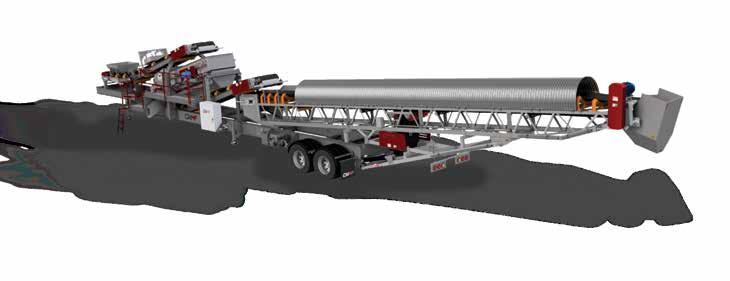
5 minute read
The Job Must Go On
Cross-training will save the day when workers leave mid-shift
BY SANDY LENDER
Your typical paving project doesn’t have flex time that would make a sudden reduction in workforce easy to absorb. Employees who are hired through a work-release group must be off the job by a certain time to make sure they’re back to their lodgings by their curfew. We’ve also seen more caregivers joining the workforce who must adhere to a more fixed schedule than we’ve seen in the past. Accommodating the diverse workers we have attracted to the construction industry means the work shift may have defined start and stop times depending on the needs of the crewmembers, in addition to lane closure/opening regulations and penalties from agencies. This all boils down to accomplishing the job within a rigid timeframe.
Now let’s say a crewmember goes missing mid-shift. These are real scenarios experts from the field have experienced:
• The sheriff pulls up and arrests the screed operator for a minor felony;
• Your most experienced laborer falls over from heat exhaustion;
• The tack truck driver gets a call from the principal’s office saying his child is ill and must be collected from school ASAP; or
• The paver operator gets frustrated by one too many haul trucks bumping into his machine or ignoring his hand signals and he walks off the job.
Of course, in the case of a worker falling ill or having an accident, you stop everything and help your colleague in crisis. Health and safety are paramount on the project. But once the person is safely transported to a medical facility, the job must go on. Taxpayers, homeowners or a client’s customers want their thoroughfare, residential streets and parking lots back in a hurry.
When an equipment operator or other key member of the crew “disappears” mid-shift, the foreman may have to double up his own tasks to get through the day (or night). His first call doesn’t necessarily have to be to the plant to shut everything down. Maybe.
Clay Jordan, the president of ProConsult LLC, suggested the first and closest option when a crewmember calls in sick or leaves the site in the middle of the day, is to pull from the company workforce. You should have team members on standby and you might have someone enjoying a day off. It’s time to call on one of them.
“This is typically only possible if the contractor has fully embraced cross-training,” Jordan cautioned. “Cross-training can offer an efficient solution when a crewmember either temporarily or permanently drops out. Ideally, the entire crew should be cross trained on all positions: foreman, paver operator, screed operators, roller operator, saw-cutting, measuring/calculating, and traffic control. Cross-training should be completed on the job and in-house.
“In addition, online training can bring a higher level of expertise and new information into the company fold. The goals are to build an effective team, improve communications, elevate trust and competence, and fast-track problem-solving.”
John Ball, the proprietor of Top Quality Paving & Training, shared a story where cross-training could have prevented hardship in his early days as a foreman. As the paving crew finished running out the last of eight trucks in the day’s first round, Ball asked one of two roller operators to tamp around a catch basin while two laborers performed oth- er handwork. The roller operator refused; he said it wasn’t his job to do such labor.
“It got pretty tense,” Ball said. “I told him he could do the job, or he could go home. And he walked off the job. He went home.”
Because it was 8:00 a.m. and the crew had 800 tons to lay that day, Ball had to take over the job of rolling as well as figuring yield, dumping trucks and managing the project.
“If the other guy on the paver knew how to do yield, he could do that while I concentrated on the rolling and dumping trucks. But the company hadn’t cross-trained all the crew. I had come up through the ranks, so I knew how to run the roller, but the new laborers didn’t know. The other guys weren’t cross trained.”
Paving Consultants You Can Count On
In alphabetical order by last name, here are the consultants who offered commentary for the scenario in this article.
John Ball III
Top Quality Paving & Training (603) 493-1458 tqpaving@yahoo.com https://tqpaving.com
Clay Jordan ProConsult LLC (602) 541-2403
Clay.Jordan@ProConsultAZ.com https://proconsultaz.com
The good news is the fellow returned to the job the next day, ready to be a team player. And Ball promotes the concept of cross training all members of the crew to this day.
If cross-training isn’t part of the company culture yet, the foreman faced with a missing crewmember may need to look across the workforce for a worker who has the right skill set.
“The second, and possibly the least used option, is to reach out to the company’s horizontal network,” Jordan suggested. “For prime contractors, using ‘other’ paving companies as subcontractors to supplement their capabilities is a common practice on larger projects.”
You may find value in a staffing service like HardHat Workforce Solutions, which has 16 regional offices and 20 years under its belt recruiting craftsmen and trades workers. They list the following skilled trade positions they recruit workers to fill:
• Electricians – Commercial and Industrial
• Plumbers
• Pipefitters
• Welders – Pipe and Structural
• HVAC/Sheet Metal
• Millwrights
• Equipment Operators
• Carpenters
• Construction Labor
While a staffing agency like HardHat isn’t necessarily solving a three-hour emergency absence, it can offer a company a cushion that the human resources department didn’t have to advertise or interview to fill, and so on.
Also look to the nearby contractors in your state asphalt pavement association. “Through networking and building healthy horizontal relationships with partner paving companies—considered by some to be ‘The Enemy’—paving contractors have an additional pool of skilled workers to draw from in case of emergency,” Jordan shared. “This approach supplies a broader foundation of support for the prime contractor and can also lead to large-scale reciprocation on projects where the competition wins the bidding process.”
The best-case scenario is having a robust crew with redundancy built in. Having extra laborers on standby who know how to run the roller, dump the trucks, figure yield, work the automation on the screed, calibrate the tack truck and so on, is a luxury most field crews only dream of. But why is it only a dream?
Jordan shared that any contractor you ask will answer with a resounding, “Yes, we do cross-train!” “However, as with many aspects of paving project management, it often becomes clear that the program is substantially lacking in necessary depth,” he shared. “An efficient cross-training program requires daily implementation and multiple sources for wide-ranging learning.”
Ball worked with AsphaltPro Magazine to develop an online paving training course that teaches back-to-basics and outlines different tasks specific workers typically learn. This is only one of the many resources available to companies. He also goes from contractor to contractor throughout the paving season helping companies build wide-range learning and best practices across a paving crew. But turnover, retirements and workers leaving the industry means pavers still have more cross-training to do to stay prepared for both temporary and permanent absences during the shift.







